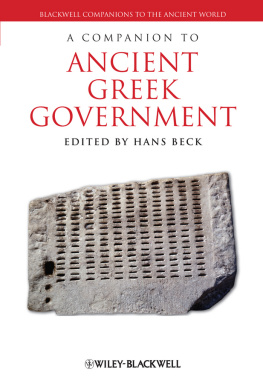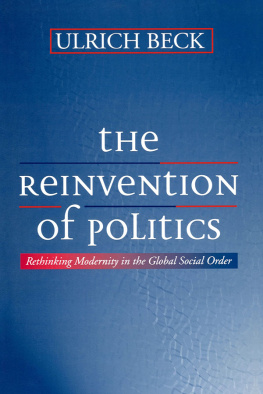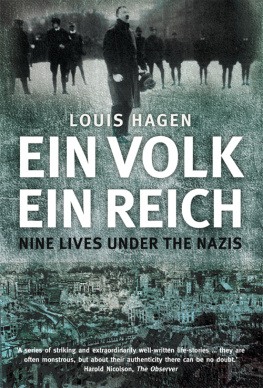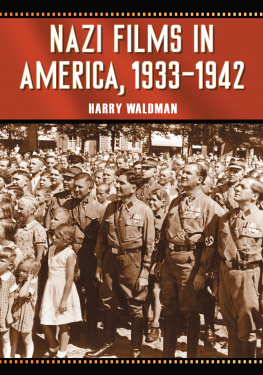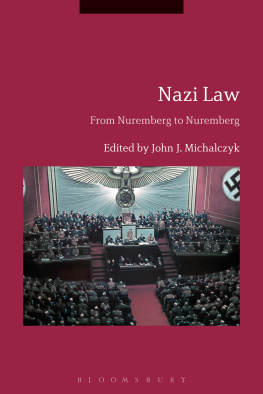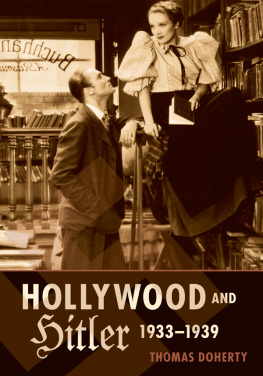The Fateful Alliance
GERMAN CONSERVATIVES AND NAZIS IN 1933:
THE MACHTERGREIFUNG IN A NEW LIGHT
HERMANN BECK

Published in 2008 by
Berghahn Books
www.berghahnbooks.com
2008, 2010 Hermann Beck
First paperback edition published in 2010
All rights reserved.
Except for the quotation of short passages
for the purposes of criticism and review, no part of this book
may be reproduced in any form or by any means, electronic or
mechanical, including photocopying, recording, or any information
storage and retrieval system now known or to be invented,
without written permission of the publisher.
Library of Congress Cataloging-in-Publication Data
Beck, Hermann
The fateful alliance : German conservatives and Nazis in 1933 : the Machtergreifung in a new light / Hermann Beck.
p. cm.
Includes bibliographical references.
ISBN 978-1-84545-496-8 (hbk) ISBN 978-1-84545-680-1 (pbk) 1. GermanyPolitics and government19181933. 2. Deutschnationale VolksparteiHistory. 3. Nationalsozialistische Deutsche Arbeiter-ParteiHistory. 4. ConservatismGermanyHistory. 5. National socialism. I. Title.
DD240.B3389 2008
943.086'2dc22
2008007615
British Library Cataloguing in Publication Data
A catalogue record for this book is available from the British Library
A version of was originally published in 2005 as Hermann Beck,
The Nazis and their Conservative Alliance Partner in 1933: The Seizure of
Power in a New Light, Totalitarian Movements and Political Religions 6:2 (2005),
215243, Taylor & Francis, journal website: http://www.informaworld.com.
A version of was published in 2006 as Hermann Beck, Between
the Dictates of Conscience and Political Expediency: Hitler's Conservative
Alliance Partner and Anti-Semitism during the Nazi Seizure of Power,
The Journal of Contemporary History 41:4 (October 2006), 611640, Copyright @ SAGE Publications, 2006, by permission of Sage Publications Ltd.
Printed in the United States on acid-free paper
ISBN: 978-1-84545-496-8 hardback
ISBN: 978-1-84545-680-1 paperback
CONTENTS
PREFACE
This study has a long history. In 1996, when I shifted the focus of my research from nineteenth-century conservatives and bureaucrats to the late Weimar Republic and the early Nazi period, I was interested initially in the political behavior of German professional classes and higher officials, commonly summarized under the term Bildungsbrgertum, or cultivated bourgeoisie. Germany owed its reputation in scholarship, administration, and technical expertise to this numerically small, but socially influential, university-trained elite. The Bildungsbrgertum was a uniquely German phenomenon that originated as a distinct social class in the second half of the eighteenth and early nineteenth centuries. From the first, it was characterized by its close relationship to the state, since its strongest component came from the upper echelons of state bureaucracies in the various German states. In addition to high officials, this class included the academically trained professions, notably university professors, members of the legal profession, the Protestant clergy, and medical doctors, most of whom were state officials as well. Until 1879 lawyers, for example, had to be licensed by the state, and medical doctors had barely managed to extricate themselves from the fetters of state governments by the revolutions of 1848. University education and examinations in Germany continue to be state-regulated to this day.
The constituent element of the Bildungsbrgertum was the common Bildung of its members.
Politically, the Bildungsbrgertum initially tended toward liberal ideas, though there were great differences within the group as a whole: lawyers and members of the emerging free professions were more liberal than civil servants. In the revolutionary Frankfurt parliament Bildungsbrger represented all political orientations, though liberals clearly outnumbered conservatives. The liberalism of the majority of the Bildungsbrgertum was determined by its opposition to the aristocracy, its struggle for constitutional reform, and the quest for a sovereign nation-state. Before 1866, nationalism was a liberal ideal; the aristocracy and other conservatives all across the German states were opposed to a national unification that would entail partial forfeiture of their privileges. But as opposition to Bismarck's policies evolved into support, progressive liberalism turned into national liberalism and, gradually, by the end of the 1870s, the bulk of the Bildungsbrgertum had lost its forward-driving liberal orientation. By the 1890s, many had turned into advocates of imperialist policies and defenders of an aggressive nationalism. In this shift to conservatism, as later to National Socialism at the end of the Weimar Republic, the future members of the Bildungsbrgertumuniversity studentswere in the vanguard of political change: students preceded the established Bildungsbrgertum in appropriating a new conservatism. Before the German defeat in the First World War and the subsequent economic turmoil and inflation, this cultivated bourgeoisie had enjoyed significant material security and comfort, as well as greater social prestige than its counterparts in other European countries. To them, defeat in the war was more than a military disaster: it signified a personal humiliation and the loss of a distinct cultural identity. As a result, large sections of the educated elite moved further to the political right. From the beginning, they vehemently rejected the new Republic that bore the birthmark of a humiliating defeat. The educated elite's fate had been closely aligned with that of the Empire; with the Empire's demise, it suffered a decline in reputation that increased its alienation from Weimar, to which inflation added the grievance of material destitution. The inflation broke the economic spine of the Bildungsbrgertum, whose lifestyle had been supported largely by their savings, as regular salaries rarely sufficed to maintain the material accoutrements that went with their exalted social position, such as domestic servants, Bildungsreisen, and a costly education for their offspring. Probably no part of the German population felt the humiliating changes in everyday life more deeply than the educated elite; none felt more distant from a republican regime with which reconciliation seemed impossible. Dispossession destroyed its political instinct, making it susceptible to political choices that formerly pride alone might well have precluded.
Pervaded by the certainty of their social and cultural superiority, the majority of the conservative and national-minded Bildungsbrgertum initially showed little interest in the Nazi movement, despite the economic decline of a majority of its members. Until about a year before Hitler came to power, it was thus mostly the academic proletariat, the dplac among the cultivated bourgeoisie, those filled with festering resentment toward their more successful colleagues, who expressed their spite by voting for the NSDAP. Even though extreme nationalism, the hatred of Versailles and the November criminals and, in some instances, anti-Semitism provided common ground with National Socialism, the message put forth by National Socialists was too simplistic for the average member of the Bildungsbrgertum. Its claim to epitomize a culturally superior segment of the population ran counter to the anti-intellectualism of the Nazis.
But why then did a vast segment of the Bildungsbrgertum
Next page


